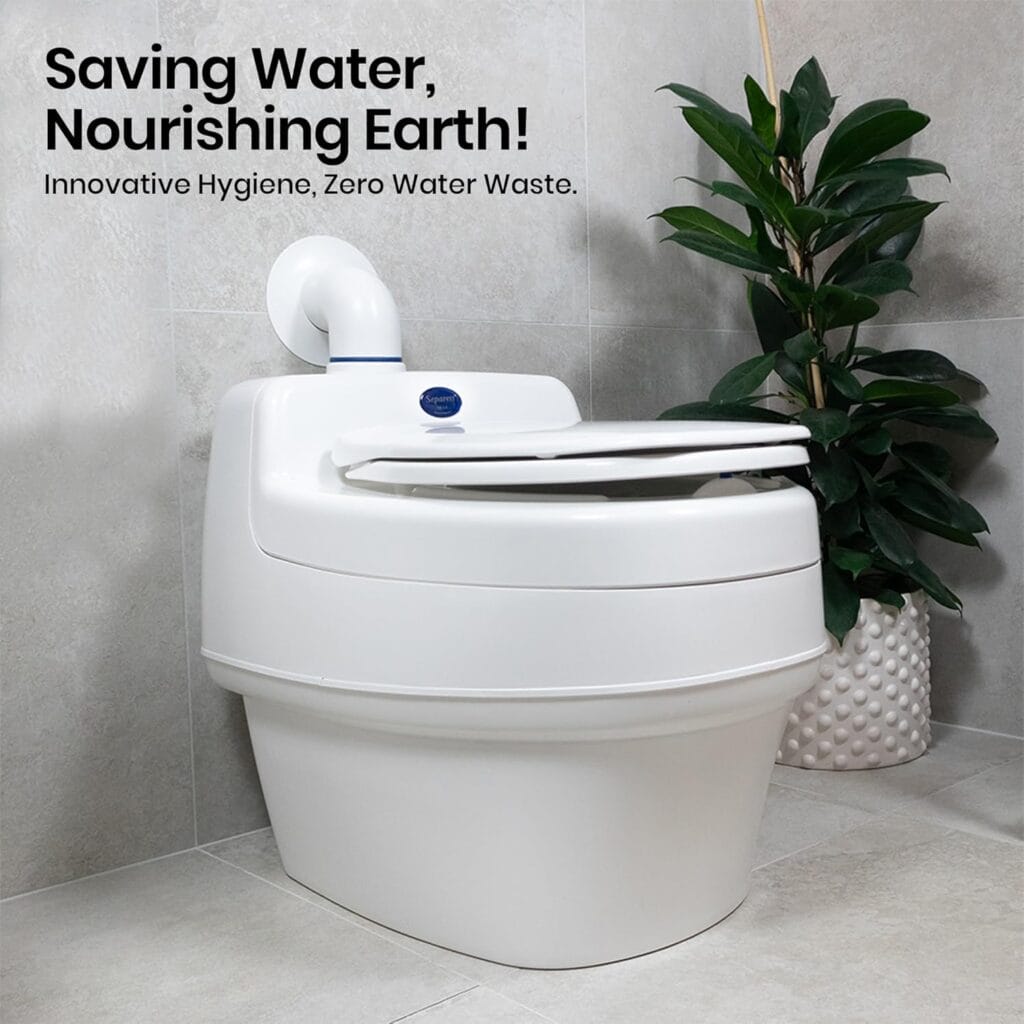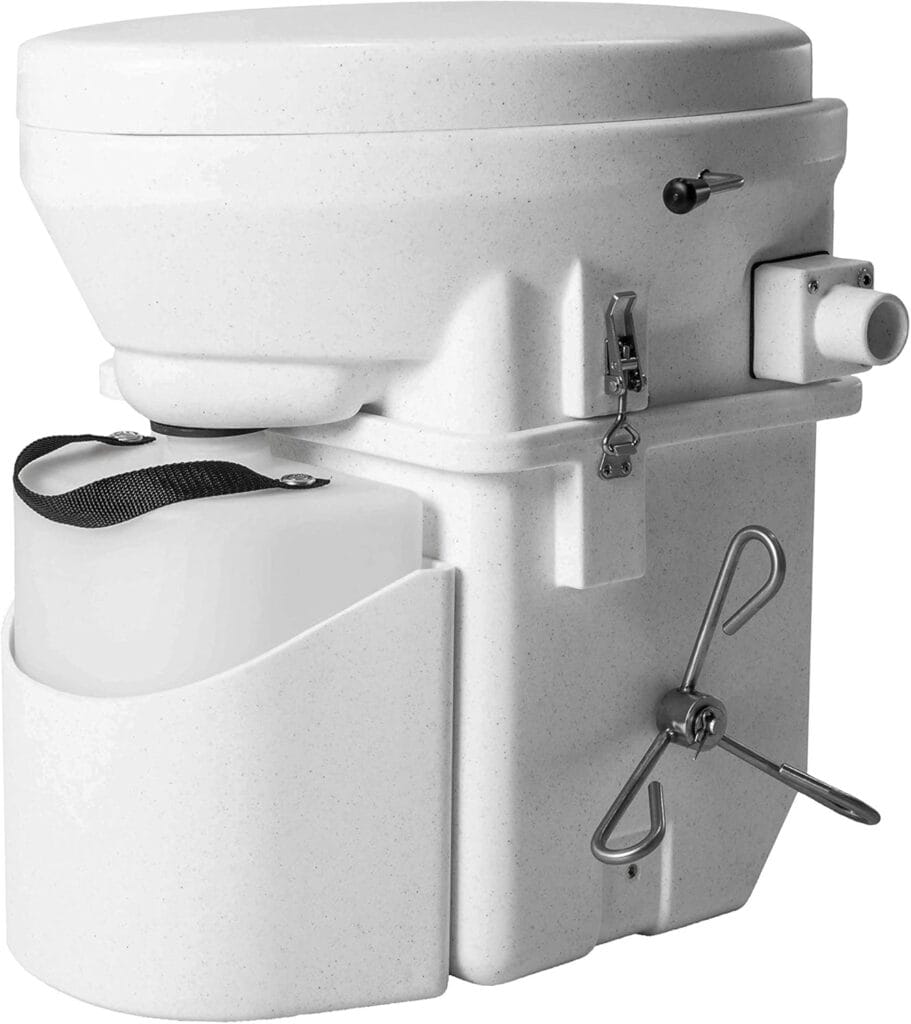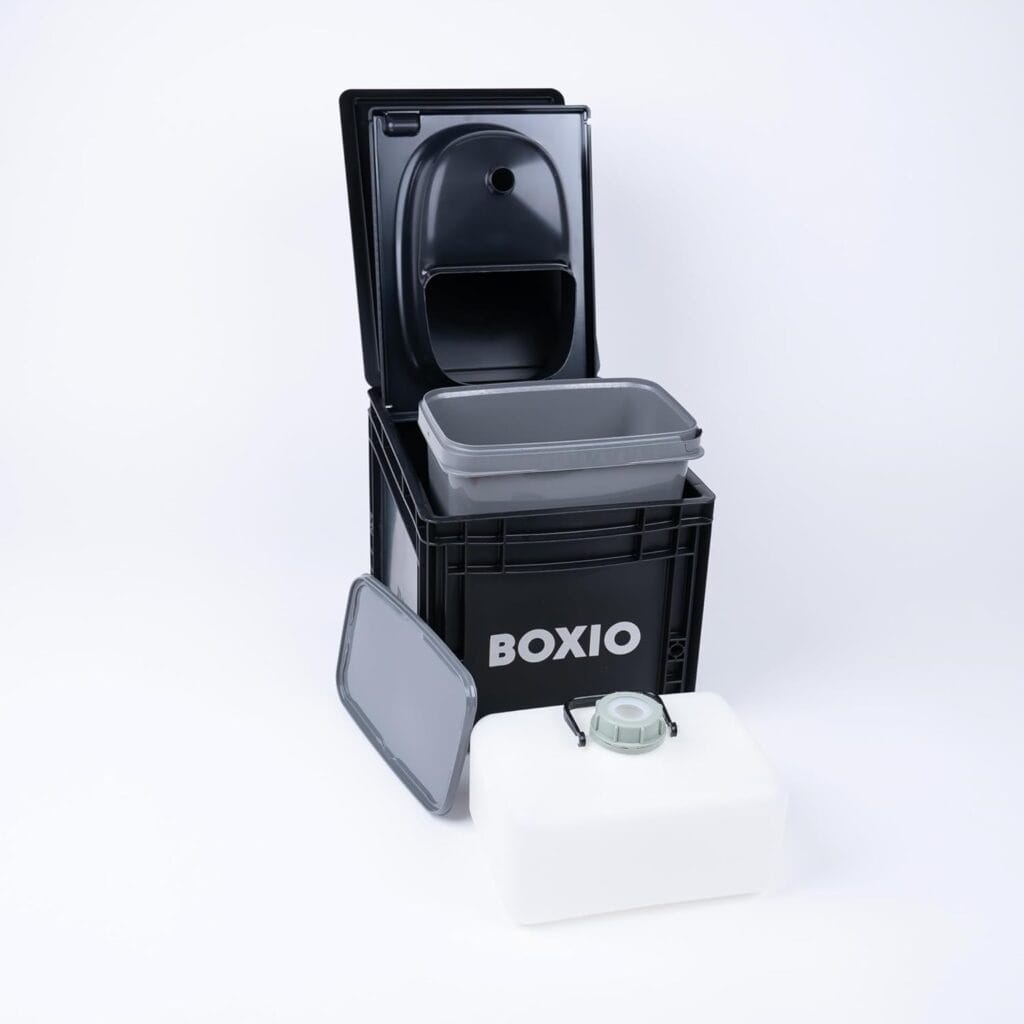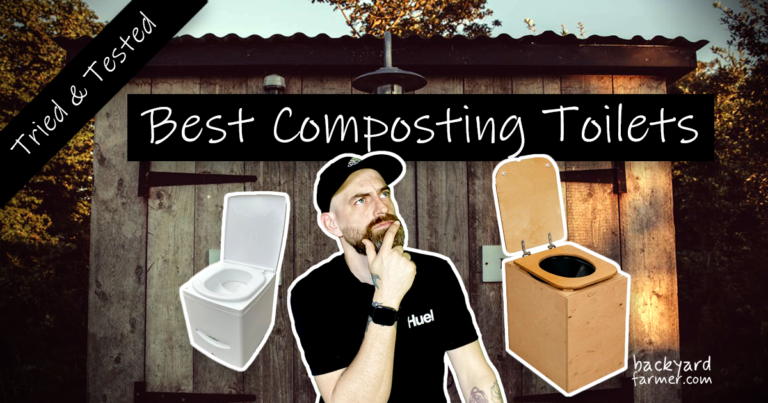Introduction
More people are embracing off-grid living, tiny homes, and sustainable lifestyles, and as a result, the best composting toilets have become a must-have for those seeking an eco-friendly sanitation solution.
What is a Composting Toilet?
A composting toilet is a waterless, self-contained system that relies on natural decomposition to break down waste while eliminating odors and reducing environmental impact. Whether you’re setting up a cabin, outfitting an RV, or looking to conserve water, composting toilets offer a reliable, low-maintenance alternative to traditional plumbing.
Why Choose a Composting Toilet?
- No Sewer or Septic Needed – Uses natural decomposition to manage waste, making it ideal for remote locations.
- Water-Saving Solution – Helps reduce water usage in off-grid homes, RVs, boats, and eco-conscious households.
- Minimal Odor – Urine separation and proper ventilation keep smells under control.
- Low Maintenance – Requires fewer emptying cycles and little daily upkeep.
Top 3 Composting Toilets Compared
Choosing the right composting toilet depends on factors like capacity, ease of use, ventilation, and maintenance. In this guide, we’ll compare the best composting toilets to help you find the ideal option for your needs:
- Separett Villa – The best choice for full-time home and cabin use, offering high capacity and minimal maintenance.
- Nature’s Head – Perfect for RVs, boats, and tiny homes, featuring a rugged design and effective odor control.
- BOXIO – A budget-friendly, ultra-portable solution, ideal for camping and van life.
Each model has unique advantages, whether you need a high-capacity system for a permanent setup or a lightweight option for travel. Let’s explore these options and find the best composting toilet for your lifestyle.
How Composting Toilets Work
The best composting toilets provide a waterless, eco-friendly solution for waste management, making them ideal for off-grid homes, RVs, and sustainable living. Unlike traditional flush toilets, they use natural decomposition and evaporation to efficiently break down waste while eliminating odors. This process requires minimal maintenance and converts human waste into compost that can be safely disposed of.
Key Components of a Composting Toilet
- Urine Diversion System (for some models)
- Separates liquid and solid waste to help control odors and accelerate decomposition.
- Urine is typically directed to an external container or drainage system for easy disposal.
- Solid Waste Chamber
- Collects solid waste and toilet paper in a compostable bag or bin.
- Some models include agitators that mix waste with a bulking agent (e.g., sawdust, peat moss) to enhance decomposition.
- Ventilation System
- A small fan or vent pipe removes moisture and prevents odor buildup.
- Ensures continuous airflow, keeping the composting process efficient and odor-free.
- Bulking Agents
- Materials like peat moss, sawdust, or coconut coir absorb moisture and support aerobic decomposition.
- Maintain the right balance to prevent odors and ensure proper waste breakdown.
How the Composting Process Works
- Waste Separation & Collection
- In urine-diverting models, liquids drain into a separate container while solids remain in a composting chamber.
- In self-contained models, all waste is stored in a single unit until it’s ready for disposal.
- Moisture Control & Aeration
- Excess moisture is removed through a ventilation system, while bulking agents absorb any remaining liquid to maintain compost balance.
- Proper airflow encourages aerobic bacteria to break down waste efficiently.
- Decomposition & Odor Control
- Beneficial bacteria and organic materials naturally break down solids over time.
- Fans and ventilation systems prevent anaerobic conditions, which cause unpleasant odors.
- Final Disposal of Composting Toilet Waste
- Once the chamber is full, solid waste can be emptied into an outdoor composting bin or disposed of according to local regulations.
- Some models require emptying every few weeks, while high-capacity options can go months before needing maintenance.
Types of Composting Toilets
- Urine-Diverting Toilets (e.g., Separett Villa) – Separate liquids from solids to reduce odor and speed up decomposition.
- Self-Contained Composting Toilets (e.g., Nature’s Head) – Keep all waste in a single unit with an internal composting chamber.
- Portable Dry Toilets (e.g., BOXIO) – Use a simple bucket-and-bag system with sawdust or hemp fiber to absorb moisture.
By relying on natural processes and simple maintenance, the best composting toilets offer a practical, low-maintenance, and sustainable sanitation solution for off-grid homes, RVs, boats, and eco-conscious households.
Top 3 Best Composting Toilets Compared
The best composting toilets provide a waterless, eco-friendly alternative to traditional toilets, making them ideal for off-grid homes, RVs, and sustainable living. Choosing the right model depends on factors like capacity, ease of use, ventilation, and maintenance needs. Below, we compare three of the best composting toilets, each suited for different needs—whether you require a full-time home system, a self-contained RV toilet, or a lightweight, portable option for travel.
The Best for Home & Cabin Use
The Separett Villa is a high-capacity, urine-diverting composting toilet designed for permanent installations in homes, cabins, and off-grid properties. It offers a comfortable, near-traditional toilet experience with minimal upkeep.
Key Features
- Urine-diverting system reduces odor and speeds up composting.
- Large waste capacity allows for 4–6 weeks of use before emptying.
- Built-in 12V ventilation fan ensures odor-free operation.
- Compatible with AC or DC power, making it ideal for off-grid setups.
- Durable, long-lasting construction for extended use.
Pros:
- Excellent odor control with a continuous ventilation system.
- Low-maintenance—requires infrequent emptying.
- Comfortable standard seat height, similar to a regular toilet.
Cons:
- Requires power for the fan, needing an AC or DC connection.
- Larger size makes it better suited for fixed installations.

Separett Villa
Off-grid ready, odour-free, and built to last—meet your no-fuss composting toilet solution.
Ideal for RVs, Boats & Tiny Homes
The Nature’s Head is a compact, self-contained composting toilet built for small spaces and mobile living. It’s durable, energy-efficient, and a great choice for those on the move.
Key Features
- Self-contained system separates urine from solids to minimize odors.
- Manual agitator accelerates composting by mixing waste with bulking material.
- Low power consumption—features a 12V fan for odor control.
- Compact and rugged design fits well in tight spaces like RVs and boats.
- Handles 60–80 uses before emptying (typically 3–4 weeks for two people).
Pros:
- Highly durable, with marine-grade materials built to last.
- Odor-free operation due to the built-in ventilation fan.
- No plumbing required, making installation simple.
Cons:
- Requires manual mixing after each solid waste use.
- Urine container needs frequent emptying, about every few days.

Nature’s Head
Tough, compact, and road-ready—perfect for off-grid adventures in RVs, boats, and tiny homes.
Perfect for RVs, Boats & Tiny Homes
The Nature’s Head is a compact, self-contained composting toilet built for small spaces and mobile living. It’s durable, energy-efficient, and a great choice for those on the move.
Key Features
- Self-contained system separates urine from solids to minimize odors.
- Manual agitator accelerates composting by mixing waste with bulking material.
- Low power consumption—features a 12V fan for odor control.
- Compact and rugged design fits well in tight spaces like RVs and boats.
- Handles 60–80 uses before emptying (typically 3–4 weeks for two people).
Pros:
- Highly durable, with marine-grade materials built to last.
- Odor-free operation due to the built-in ventilation fan.
- No plumbing required, making installation simple.
Cons:
- Requires manual mixing after each solid waste use.
- Urine container needs frequent emptying, about every few days.

BOXIO
Lightweight, no power needed, and ready for the road—your grab-and-go composting toilet for off-grid trips.
Which of the Best Composting Toilets is Right for You?
| Feature | Separett Villa | Nature’s Head | BOXIO |
|---|---|---|---|
| Best for | Homes, cabins, off-grid | RVs, boats, tiny homes | Camping, van life |
| Power required? | Yes (12V fan) | Yes (12V fan) | No |
| Odor control | Excellent (ventilated) | Excellent (ventilated) | Good (if emptied frequently) |
| Emptying frequency | 4-6 weeks | 3-4 weeks | 8-10 uses |
| Ease of installation | Requires venting & urine drain | Requires venting | No installation needed |
| Cost | $$$ (High) | $$ (Mid-range) | $ (Budget-friendly) |
Each of these best composting toilets serves different needs. If you’re looking for a long-term home solution, the Separett Villa is ideal. If you need a compact, durable toilet for an RV or boat, go with the Nature’s Head. And if portability and budget-friendliness are your top priorities, the BOXIO is the way to go.
Consider your space, power availability, and maintenance preferences to choose the best fit for your lifestyle.
Which Composting Toilet is Right for You?
The best composting toilets provide a waterless, eco-friendly alternative to traditional toilets, making them ideal for off-grid homes, RVs, and sustainable living. Choosing the right composting toilet system depends on your space, lifestyle, and maintenance needs. Below, we compare the top options based on durability, odor control, and ease of use.
Best Composting Toilet for Full-Time Home & Cabin Use: Separett Villa
If you’re looking for a long-term, low-maintenance composting toilet with minimal emptying and a near-traditional experience, the Separett Villa is the best choice.
- Best for: Off-grid homes, cabins, and permanent setups.
- Key Benefits:
- Large waste capacity lasts 4–6 weeks before emptying.
- Requires little daily upkeep.
- Ventilated system eliminates odors.
- Considerations:
- Requires electricity (12V fan) for ventilation.
- Needs proper venting and urine drainage setup.
Best Composting Toilet for RVs, Boats & Tiny Homes: Nature’s Head
If you need a rugged, compact composting toilet that fits small spaces and works well for mobile living, the Nature’s Head is a solid option.
- Best for: RVs, boats, tiny houses, and van life.
- Key Benefits:
- Compact, durable design ideal for movement.
- Low power usage with a built-in fan for odor control.
- No plumbing required, making installation easy.
- Considerations:
- Requires manual mixing after solid waste use.
- Urine container needs frequent emptying every few days.
Best Portable & Budget-Friendly Composting Toilet: BOXIO
If you’re searching for one of the best portable composting toilets for short trips and minimal setups, the BOXIO composting toilet is a great choice.
- Best for: Camping, van life, and emergency situations.
- Key Benefits:
- Extremely lightweight and easy to transport.
- No electricity or ventilation required.
- Simple, cost-effective solution.
- Considerations:
- Small capacity—holds only 8–10 uses before emptying.
- No built-in ventilation, so odor control depends on proper use.
Comparison Table: Key Features at a Glance
| Feature | Separett Villa | Nature’s Head | BOXIO |
|---|---|---|---|
| Best for | Homes, cabins, off-grid | RVs, boats, tiny homes | Camping, van life |
| Power required? | Yes (12V fan) | Yes (12V fan) | No |
| Odor control | Excellent (ventilated) | Excellent (ventilated) | Good (if emptied frequently) |
| Emptying frequency | 4-6 weeks | 3-4 weeks | 8-10 uses |
| Ease of installation | Requires venting & urine drain | Requires venting | No installation needed |
| Cost | $$$ (High) | $$ (Mid-range) | $ (Budget-friendly) |
Summary
- If you want a home-friendly composting toilet with minimal maintenance, choose the Separett Villa.
- If you need a compact, mobile-friendly composting toilet for an RV or boat, go with the Nature’s Head.
- If portability and affordability are your top priorities, the BOXIO composting toilet is the best fit.
Consider your space, budget, and waste management needs to find the right composting toilet system for your lifestyle.
Final Thoughts
The best composting toilets offer a sustainable, water-saving, and odor-free solution for waste management, making them ideal for off-grid homes, RVs, and eco-conscious living. Whether you’re setting up a self-contained composting toilet system in a tiny home or need a portable composting toilet for van life, these options provide convenience and efficiency without requiring traditional plumbing.
Choosing the right model depends on your space, lifestyle, and maintenance preferences:
- If you need a long-term, home-friendly solution with minimal emptying, the Separett Villa is the best choice.
- If you’re in a tiny home, RV, or boat and want a durable, self-contained system, the Nature’s Head is an excellent option.
- If portability and affordability matter most, the BOXIO is ideal for camping, van life, or emergency use.
Each model has its own unique strengths, so consider factors like power availability, odor control, ease of installation, and emptying frequency before making your decision.
Switching to a composting toilet helps reduce water waste and simplify waste management, while also allowing you to embrace a greener, more self-sufficient lifestyle. No matter which option you choose, the best composting toilets provide a reliable, efficient, and eco-friendly solution for handling waste in off-grid homes, RVs, and sustainable living setups.







